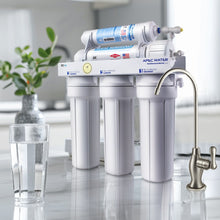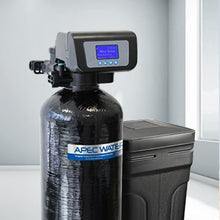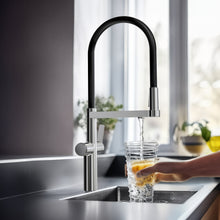When it comes to the topic of purified water, some buzzwords that get brought up are distilled water and deionized water. Even though they're both considered filtered water, they each have their own benefits and are used in their own specific scenarios, with substantial differences in their characteristics and production. This blog will explore these differences between the two to help you develop a better understanding of which would better suit your needs.
What is Distilled Water?
Distilled water is created by a process called distillation, where water is boiled until it evaporates. Its steam is then collected and condensed back into its liquid form, leaving behind most of its impurities. These impurities such as minerals, chemicals, and bacteria get left behind because of their higher boiling points compared to water, meaning they don’t evaporate at the same time. This results in highly purified water, free of contaminants.
Benefits of Distilled Water:
- High Purity: Distillation removes a large amount of the contaminants in water, including metals, salts, and microorganisms, resulting in pure water.
- Widely Available: Distilled water can be easily created and used in many different situations like car batteries, humidifiers, and medical equipment.
- Versatility: Distilled water is great for locations that are in need of purified water like in labs or regions with poorer water quality.
What is Deionized Water?
Deionized water is produced through a process called deionization where water is passed through a system that uses ion-exchange resins to remove ions from the water. The ion-exchange resins then replace these ions with hydrogen and hydroxide ions, combining to form pure water.
Benefits of Deionized Water:
- High Purity: Deionization removes most of the ions in water, including minerals, salts, and heavy metals, resulting in water of high purity.
- Suitability for Specific Uses: Deionized water is great in situations where the presence of ions could create interferences such as electronics, laboratories, and pharmaceuticals.
- Effective in Whole House Water Systems: They work well in home water systems for regions with hard water, as they can help prevent scale building in pipes and appliances.
Comparing Distilled and Deionized Water
Key Differences in Production:- Distillation: Leaving impurities behind during the phase change of water due to the difference in properties between water and the impurities.
- Deionization: Uses ion-exchange resins to remove ions from water without involving phase change.
- Distilled Water: Contains high levels of purity since most impurities and contaminants are removed.
- Deionized Water: Also high levels of purity, but targets the removal of ions, meaning it may not be as effective at the removal of other organic contaminants.
- Distillation: An energy-intensive process that can be costly to scale up.
- Deionization: More cost-effective than the latter, especially for continuous use in large scale systems.
Choosing the Right One: Factors to Consider
Here are some factors to consider when deciding between distilled and deionized water:
- Application: Deionized water would be better suited for scenarios where ion interference is a more prevalent issue such as in laboratories or electronics. Distilled water is sufficient for more general applications, such as drinking or for medical devices.
- Cost: If cost is a significant factor, deionized water would save more money for continuous use and in larger systems.
- Water System Compatibility: For water filtration systems such as APEC Water, check whether it supports distilled or deionized water. Some systems work better with one type of water compared to the other.
- Contaminant Concerns: For more thorough purifications where more contaminants are removed such as bacteria and viruses, distilled water would be able to offer a more in depth solution.
Conclusion
Although distilled and deionized water both offer very pure water, their forms of purity are very different and they should be used for their respective niches. Understanding the differences between these two types of purified water will help you make a better informed choice when deciding between an APEC deionization system or an APEC distillation system.
Assessing your specific needs and putting factors like cost, application, and system compatibility into consideration is quintessential to coming to a decision about something as important as your water. Whether you're setting up a heavy-duty whole house water filter for chlorine removal, or providing water for your laboratory, knowledge is power and will help you come to the best decision.



